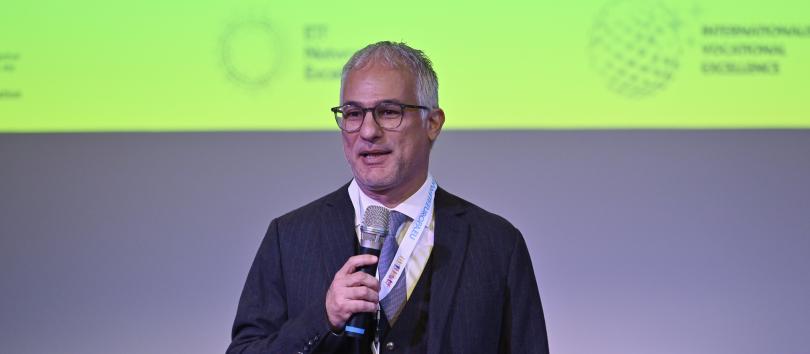
Bridging education and sustainable finance: Insights from Georgios Zisimos
Ten years ago, even the ETF’s Head of Policy Advice and EU Programming Georgios Zisimos would have been unable to imagine the work he is leading today.
Back then, bringing the worlds of finance and education together from the perspective of education and training would have been unthinkable, he remembers.
Today, that project has ripened into a brand-new publication and a high-level event to be held in Brussels on 4 June, with representatives of international financial institutions (IFIs). In the process, it has transformed the ETF’s future strategy and recast its role on the world stage for the years to come.
Focus on policy
An educationalist by trade, Zisimos has occupied a wide range of posts throughout his career. Originally a technology teacher working in schools in London and his native Cyprus, he began following a more political path when he became secretary general of a teachers’ union and advisor to a government scientific committee. That led to his first post at the EU, working as a cabinet member for the European Commissioner for Education. When the second Barroso Commission’s mandate came to an end in 2014, he came to work at the ETF.
I work on anything that concerns the intersection between EU policies and our partner countries in education and training, Zisimos explains. It’s all about contextualising policy.
Transforming vocational education
As a result, his work at the ETF has revolved around two axes: the EU on the one hand, and education provision on the other.
Overall, we’ve seen significant progress in vocational training in our partner countries, Zisimos explains. Vocational schools are no longer a second choice for students and parents. The Copenhagen Process has really helped put the emphasis on policies in vocational education and training [VET].
Particular sources of satisfaction include the closer links that are being forged between VET and higher education – previously separate worlds, whose boundaries are now beginning to blur – and the success of centres of vocational excellence in bringing vocational schools, local authorities, businesses, start-ups and other stakeholders together in clusters.
A new role for the ETF
That changing landscape has triggered a transformation in the way that the ETF operates as a member organisation in the European family.
We’re no longer only about vocational training, Zisimos explains. Today, our focus is on human capital development: the crossroads between education and training, and employment. And there’s no specific age for that. We live in an era of lifelong learning.
Wars and conflict have revealed the need for the ETF to remain flexible and agile, and capable of providing its services in conditions that are anything but straightforward. In parallel, new trends and technologies are remodelling the world of work.
We need to be informed about them in order to provide the best possible advice to our stakeholders, says Zisimos. We need to be focused on the skills that are going to be required in the future.
Today, the ETF is increasingly seen as a knowledge hub – both by itself, and by the institutions it partners with.
There are huge opportunities here for us, Zisimos explains. Human capital development involves addressing a broad range of issues. And at the ETF, we don’t just deal in general knowledge. We have a detailed understanding of how education and training works in specific contexts: specific countries, specific sectors, and specific geopolitical environments. It’s that ability to contextualise that makes us different.
Working together
And it is that ability that has triggered the ETF’s groundbreaking partnership with IFIs. Until very recently, the projects funded by those institutions did not systematically address the issue of skills. Yet if societies are to successfully negotiate the green and digital transitions, skills are a crucial part of the equation.
That’s the discussion today, and it makes total sense for a knowledge hub like the ETF and the IFIs to engage in that discussion, says Zisimos. We say: when you’re planning something, make sure you include the skills dimension early enough. Money isn’t the only thing that’s needed. There has to be something else too.
That something else requires detailed experience in how human capital development initiatives play out in local contexts.
That’s what the IFIs are talking to us about, Zisimos continues. They’re outside their comfort zone and so we have to go out of our comfort zone too to meet each other. Before, they would have turned to an external partner on topics like these. Now they can turn to us.
And the message they are hearing is that the skills need to be integrated into every development project from step one.
It hasn’t always been easy, Zisimos admits. We were coming from two different worlds, and we had to find common ground. But it is alliances like these that help us to grow and provide better services.
As this new publication and the event in Brussels on 4 June show, those alliances are now stronger than ever.
Did you like this article? If you would like to be notified when new content like this is published, subscribe to receive our email alerts.